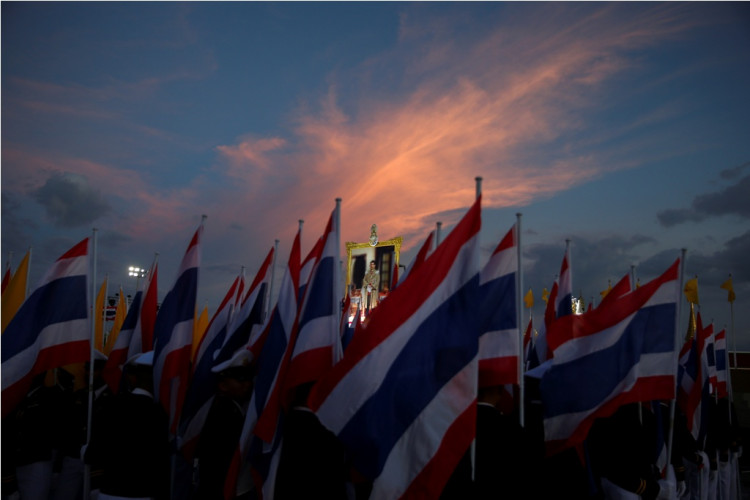The investigation into the recent shooting at a shopping center in Thailand's capital, Bangkok, continues. On Thursday, Thai police arrested two men accused of selling firearms to the suspected shooter.
On Tuesday afternoon, a 14-year-old teenager opened fire at the Siam Paragon shopping center in Bangkok, killing two individuals from China and Myanmar and injuring five others, including a Chinese national, a Laotian, and three Thais.
According to police, the suspect, a student from a private school in Bangkok, had a history of mental health treatment. The handgun he used had been modified to fire live ammunition. He now faces five charges, including premeditated murder and possession of a firearm without a permit.
This incident marks the third major shooting in this Southeast Asian tourist hotspot in just over three years, reigniting discussions about gun control in Thailand. On October 6, 2022, a former police officer, dismissed for drug use, attacked a childcare center in northeastern Thailand with firearms and knives, killing at least 36 people. On February 8, 2020, a soldier indiscriminately shot and killed 29 people in a mall in Nakhon Ratchasima.
Chanatip Tatiyakaroonwong, a Thai human rights researcher with Amnesty International, noted that given the three similar incidents in recent years, it's a reminder that these might not be isolated tragedies. Thailand needs to reassess whether gun violence is a systemic issue.
While Thailand's gun violence is nowhere near the levels seen in the U.S., the country stands out in Asia for its gun-related issues.
Data from the Small Arms Survey (SAS) in 2017 indicates that over 10.3 million civilians in Thailand own firearms, equating to about 15 guns for every 100 people. In contrast, neighboring Malaysia has less than one gun per 100 people. Of these, only around 6.2 million firearms are legally registered.
The Institute for Health Metrics and Evaluation (IHME) data from 2019 shows that Thailand ranks second in Southeast Asia for firearm homicides, trailing only the Philippines.
Beyond high private gun ownership rates, lax oversight has exacerbated the proliferation of gun violence. While the Thai government has relatively strict reviews for legal gun ownership, requiring applicants to be over 20 and undergo background checks while providing a valid reason for gun ownership, penalties for illegal possession can be as severe as 10 years in prison and a fine of 20,000 Thai baht.
However, there are significant loopholes. Many firearms in Thailand are sold by government employees or law enforcement officers, who can purchase unlimited quantities of weapons from the government at significant discounts. Additionally, gun permits in Thailand are valid for life, unlike many countries that set expiration dates. Many local agencies rarely verify the identities of original permit holders, further lowering the bar for legal gun ownership.
Furthermore, there are numerous channels for the general public to acquire firearms. For instance, replica weapons, which can be purchased without a permit, are popular among Thai military enthusiasts. The firearm used in the recent Siam Paragon shooting was such a replica. A thriving black market, driven in part by arms smuggling from neighboring Myanmar, provides another avenue.
Paul Quaglia, CEO of risk assessment firm PQA Associates in Bangkok, believes that gun regulation in Thailand is "virtually non-existent." The former CIA employee stated, "There's no systematic effort to register firearms here. The problem in Thailand is the proliferation of guns, both legal and illegal. It's very easy for the public to get their hands on them."
Thai authorities are considering tightening gun regulations. On Wednesday, Prime Minister Prayuth Chan-o-cha mentioned taking "preventive measures" to prevent future tragedies. On the same day, the National Police Chief Suwat Jangyodsuk spoke of measures to address "legal loopholes."
Beyond regulatory issues, the prevailing gun culture in this predominantly Buddhist nation cannot be overlooked. In Thailand, firearms are to some extent seen as symbols of wealth and privilege. In rural areas, locals often resort to firearms to settle disputes. Thai police officer Naras Savestanan once said that sometimes conflicts arise, and firearms seem to be the answer. "Guns level the playing field."
Experts suggest that the circulation of millions of firearms, combined with lax regulation and enforcement, exacerbates gun violence. Both the Thai government and the public need to consider how to find a long-term solution.
For Thailand, which heavily relies on Chinese tourists for revenue, this tragedy further tarnishes its image as a tourist destination. The Thai government is actively engaging in "crisis PR" to alleviate external concerns. After the incident, Prime Minister Prayuth immediately called the Chinese Embassy in Thailand to express condolences on behalf of the Thai government to the Chinese victims and to comfort the injured.
On Wednesday morning, King Vajiralongkorn and Queen Suthida of Thailand sent representatives to the hospital to comfort the injured Chinese citizens from the shooting, presenting them with flowers and consolation gifts.
Tourists in Bangkok had mixed reactions to the shooting.
Chanon Vongsanitkul, an 18-year-old Thai student, said he wouldn't be visiting the area for a while due to concerns about the security system. However, 37-year-old Chinese tourist Dean Liu remains "confident" in Thailand, believing in the country's handling of the situation and feeling minimally impacted by the incident. Israeli tourist Eyal Sheffer also expressed that he's "not worried," feeling safe and trusting the local police to handle everything.





